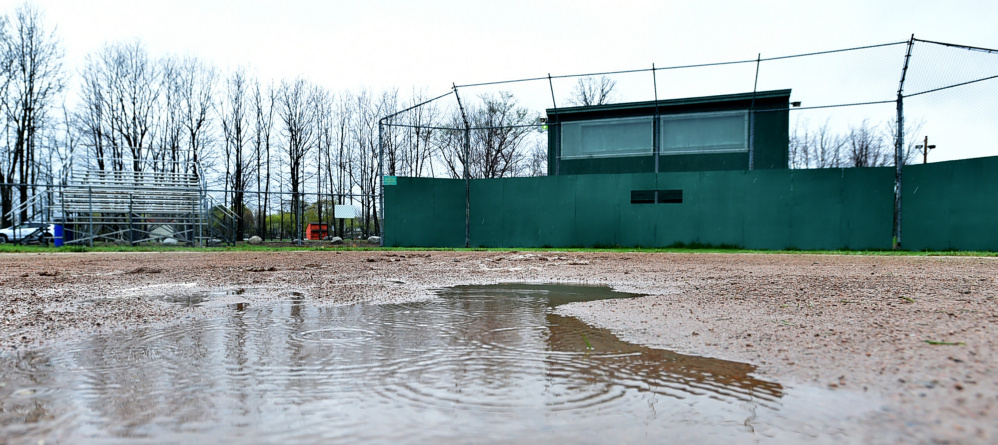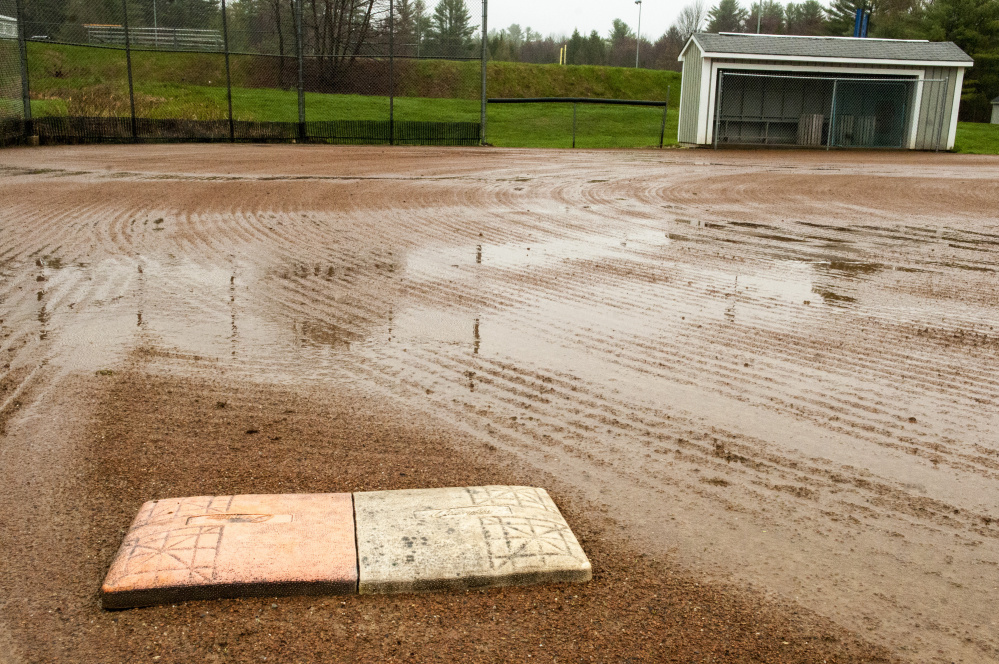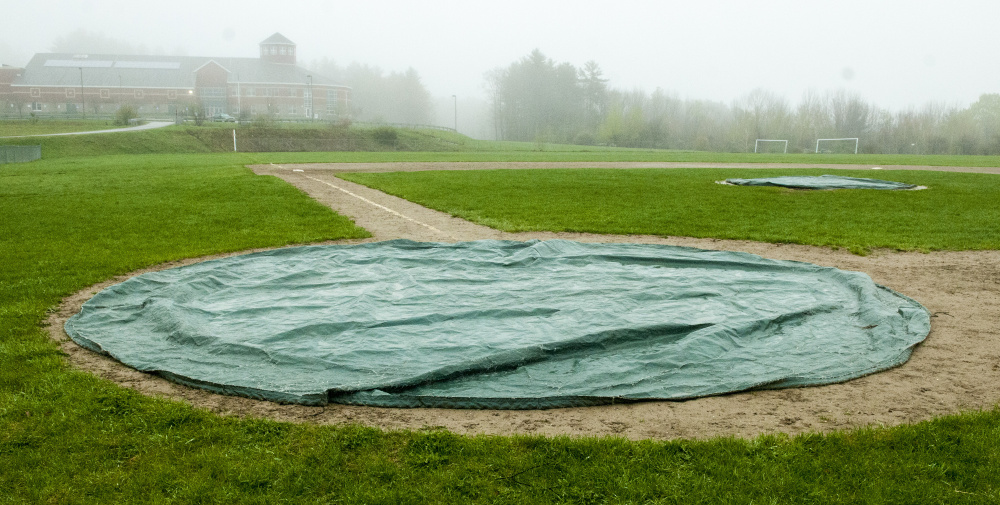The ball sits in the middle of the Winthrop High School softball infield, alone and untouched. It’s been there since the very beginning of spring, since snow covered the ground, if not before. No one has gone to pick it up, only because no one can. Not with the standing pools of water close by and soft, mushy dirt and mud in all directions.
The first week of May is drawing to a close, and forget playing and practicing. Less than a month remains in the regular season, and the Winthrop softball team has been unable to so much as step on its home field.
“(The ball has) been there for three weeks because we cannot walk out to get it without sinking up to our ankles,” athletic director Joel Stoneton said. “That is no exaggeration.”
It’s a subtle yet stark symbol for a spring that has been less a season than a headache for Maine high school athletes, coaches and athletic directors, and one that’s on its way to growing into a full-fledged migraine. Late snow pummeled the preseason, slow melting endangered opening games, cold, rainy days have caused the rescheduling of rescheduled games, and the week ahead is posing another potential blow to teams’ strained scheduling. Rain is expected to be scattered throughout the coming days, pushing the ready dates for saturated fields even further back.
“It’s the toughest (spring) I’ve had,” said Stoneton, who has been the AD at Winthrop for four years and who coached track and field for 20 seasons prior. “I’ve seen it before where there’s a ton of snow and it disappears quickly and it dries in a couple of days, but the wet conditions have never been this bad in my opinion.”
It’s not panicking time, but it has become time for schools to become flexible in order to get their games in. Baseball and softball teams, the ones facing the biggest problems regarding field suitability, have had to use other schools’ facilities, play their “home” games on their opponent’s field and cobble together creative doubleheaders. Last Saturday, for instance, the Winthrop baseball team hosted Mountain Valley, then played Monmouth Academy, which had to then travel back home to face Boothbay before the day was over.
And still, with some teams in both the northern and southern parts of the state having played as few as three games so far this season, there’s still a crunch looming to finish off the slate before June and the postseason arrive.
“With the wet weather that we’ve had recently, along with the lateness with getting on the field, there is concern with the schools with the backlogging of schedules and not being able to get all games in,” Maine Principals’ Association assistant executive director Mike Burnham said. “The schools do a very good job of being creative with their scheduling so that they can complete the season.”
In the event of more uncooperative weather, Burnham said extending the regular season a few days, a step taken in previous years, would be considered. A drastic scenario would be shortening the season, but Burnham stressed that that’s a last resort, and a call that wouldn’t be made until the number of games remaining exceeded the number of days left to play them.
“We’re certainly not there,” Burnham said. “I would prefer to not look at that until all other options are exhausted.”
One option that isn’t on the table, Burnham said, is playing games on Sundays, due to a long-standing agreement between the schools.
“Sunday is not an available day for MPA-sanctioned activities,” he said.
Even if the weather turns, however, the impact of a soggy spring has already been felt. The Mt. Blue softball team can attest to that. The Cougars haven’t had a home game yet and, like Winthrop, haven’t even been able to practice on their field. The end of the UMaine Farmington season freed up Prescott Field for use, however, and gives the Cougars a dry venue until theirs is ready, but not before a 1-5 start to the season that coach Ron Smith said is due largely to having to rely on gym work and parking lot practices.
“Balls play a lot differently on dirt than they do on hard wood or pavement,” he said. “We’re trying to be competitive, but we’re having a lot of errors right now and I think a big chunk of it is not practicing on dirt.”
Baseball teams could see the coming weeks get dicey if the weather doesn’t get better, and soon. Pitch count rules were enacted before this season, and if continued postponements force teams to deal with the prospect of doubleheaders or four-game weeks, teams could be forced to exhaust their pitching depth — which, in the case of 11-deep Winslow, could mean pitching players who haven’t taken the mound in a varsity game before just to bridge the gap to the next week.
“The key is to figure out how you want to play it. Do you want to play it where you basically have the pitcher go as long as he can, knowing you don’t have him for the next few, or kind of go more pitcher-by-committee?” coach Aaron Wolfe said. “I think at this point we’re more pitcher-by-committee. … We don’t have enough pitchers to do it (the other) way.”
The result could be some wild, unpredictable games as teams do whatever they can to stay on schedule.
“No one has the abundance of pitching needed to pitch so many games in a row,” Wolfe said. “There are going to be teams losing games where you’re like ‘Wow, I’m surprised they lost to that team.’ “
“The domino effect is much larger than I think people realize,” Stoneton said. “It’s probably going to come down to just getting the games in, and not (be) a true testament of one team is better than the other.”
Drew Bonifant — 621-5638
dbonifant@centralmaine.com
Twitter: @dbonifantMTM
Send questions/comments to the editors.






Success. Please wait for the page to reload. If the page does not reload within 5 seconds, please refresh the page.
Enter your email and password to access comments.
Hi, to comment on stories you must . This profile is in addition to your subscription and website login.
Already have a commenting profile? .
Invalid username/password.
Please check your email to confirm and complete your registration.
Only subscribers are eligible to post comments. Please subscribe or login first for digital access. Here’s why.
Use the form below to reset your password. When you've submitted your account email, we will send an email with a reset code.